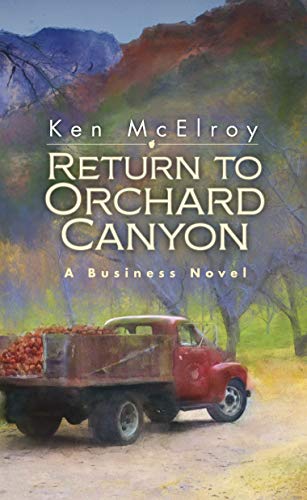Weekly Bookmarks –
171st Edition – January 15, 2025
In the case of good books, the point is not to see how many of them you can get through, but rather how many can get through to you.
Mortimer J. Adler
1. Return to Orchard Canyon
I never thought I’d hear myself describe a book as charming and good-feeling, especially in the context of personal finance books. However, that’s how I describe Return to Orchard Canyon by Ken McElroy, which is a fast and easy read.
If you lost your job today, what would you do? Would you have enough money to survive for several months while looking for employment? That’s what David Reynolds faced when he lost a job in an industry where similar positions are drying up. David is also facing the problem of high consumer debt, which is making his transition thorny.
Other key characters in the book are his daughter, his dad, and an ex-wife with whom he remains friends. I liked the ending, and this is a book to add to the personal finance bookshelf.
Return to Orchard Canyon will get you thinking―and working―toward a future you once thought was just a pipe dream. This is the fictional story of David Reynolds, his father Ron, and his daughter Meghan. Through these unlikely teachers, you’ll discover a path to understanding the plight of modern-day life. A life you yourself may be living and questioning
2. The Paper Clip Story
I reread or relisten to 2-3 books annually that are worth a reboot. James Clear’s Atomic Habits was one of those titles. I was surprised by some of the stories I had forgotten. I enjoyed hearing his retelling of the paper clip story.
A young Canadian stockbroker started his day with two jars on his desk. One was empty, and the other had 120 paper clips. When he made a sales call, he moved a paper clip to the other jar and repeated until the once-empty jar was filled.
A trite exercise? No–he was generating $5 million for his firm within two years.
What’s your favorite story in Atomic Habits?
James Clear, one of the world's leading experts on habit formation, reveals practical strategies that will teach you how to form good habits, break bad ones, and master the tiny behaviors that lead to remarkable results.
3. Accounting Escape Rooms
I was not a great accounting student, but I got a B for every A, so I had a 3.5 GPA in my major. Yet, I was ill-equipped for the real world of Big Eight audits. I was still clueless about internal controls.
As much as I loved Mr. Edwards–God rest his soul–we needed some fun. I’m talking about Professor Christopher McCullick’s idea of fun to learn accounting. When you have time, read about his idea of creating an escape room for his students.
Below are several questions that will be answered in the article:
- Does the accounting escape room have a theme?
- Will we find any financial statements in the escape room?
- Did the students have fun with the concept?
4. “I started my entrepreneurial journey with $600,000 in debt.”
This is a catchy way for an author to hook his readers into flipping the following pages of his book. Lee Benson in Your Most Important Number goes on to add:
… the best business management operating system he had (Jack Welch) ever seen.
The operating system being referenced is Lee’s MIND framework, where:
- MIN = most important number
- D = drivers of the MIN
Simple, clever, and easy to implement, especially in small teams. If you don’t have time for the book, you can listen to Lee on 2x speed in an interview with Kevin Eikenberry.
My rating: ★★★★✰
Author Lee Benson knows numbers. He grew his business from three employees to 500 with 15 consecutive years of 20 percent compounded average annual growth. Friends and families asked for his secret. He told them it came down to Your Most Important Number.
5. Another Great Open-Book Story
I maintain a list of my favorite HBR articles, one of which is Opening the Books by John Case 1997. John is a fantastic writer on this topic, but I prefer reading first-hand accounts about open-book management by founders and CEOs.
The newest title in this category is Foundational Leadership: Growth Doesn’t Start at the Top by Robert Griggs. This reads like an Andrew Carnegie and Charles Dickens rags-to-riches story, but Griggs may have the best ending.
My rating: ★★★★★
Have you ever wondered how to lead your teams effectively? In Foundational Leadership, Robert Griggs shares the story of his encounter with Jack Stack, author of The Great Game of Business.
Random Bookmarks: 111 | 95 | 44
Thank You
Thank you for reading. If you like the content above and the posts at CFO Bookshelf, may I ask a favor? Feel free to share this with other readers and comment on LinkedIn, Twitter, or Facebook.
Take care, and have a great week. Always be learning.




